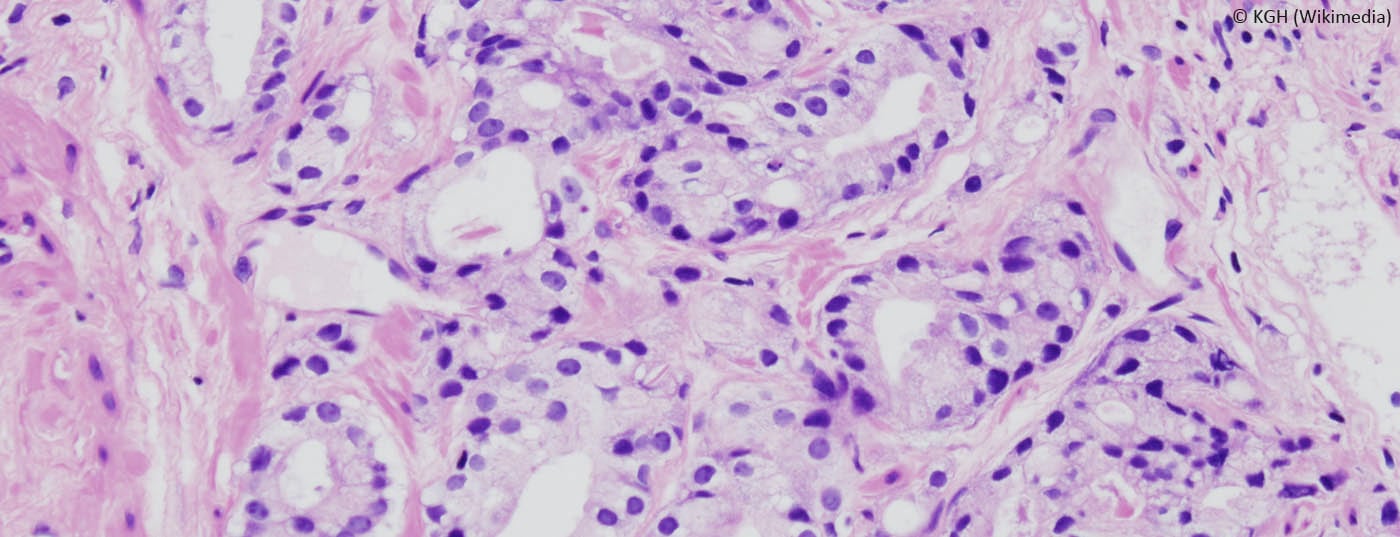We previously reported on the risk-reducing effect of statins in liver cancer prevention. Now, a retrospective study shows intriguing results in prostate cancer: when cholesterol-lowering drugs are used in parallel with androgen deprivation, progression-free survival is prolonged by approximately ten months. What are the mechanisms behind this?
The U.S. research team led by Lauren C. Harshman, MD, Boston, used in vitro analysis and retrospective data to examine the effect of statins on prostate tumor cell lines and progression-free survival in 926 patients with hormone-sensitive, recurrent or newly diagnosed metastatic prostate cancer.
Live longer without progression
At the start of androgen deprivation, 283 of the 926 patients from the retrospective cohort, or 31%, were taking statins. After a median follow-up of 5.8 years, a total of 644 patients had experienced progression. The median time to disease progression was 20.3 months. The time without progression was significantly prolonged in men taking statins (27.5 months vs. 17.4 months in non-users, p<0.001). The risk of progression was reduced by 17% (HR 0.83; 95% CI 0.69-0.99; p=0.04).
The association remained significant even after accounting for important prognostic factors and applied equally to patients with resp. without metastases (risk reduction: 21% for M0 tumors, 16% for M1 tumors).
In vitro results provide a possible explanation
The researchers see one reason for the prolonged progression-free survival in the transport protein SLCO2B1. This ensures the introduction of dehydroepiandrosterone sulfate (DHEAS), a precursor of testosterone, into the tumor cell. Statins also use this protein to enter cells, so the tumor can be expected to take up less precursor testosterone when taking statins. Conversely, this probably has an inhibitory effect on progression. In a previous study, the authors had already been able to show that genetic variants of SLCO2B1 correlated with the interval to progression.
In vitro analysis of the present study also revealed that statins indeed block DHEAS uptake by binding competitively to SLCO2B1. This further reduces the intratumoral androgen reservoir and delays progression.
In addition to the effect described, statins have numerous other anti-cancer properties, according to the authors, which could also be responsible for the effect in liver cancer, for example. Among other things, this includes the promotion of apoptosis. Moreover, lowering cholesterol is beneficial in itself, as it is a precursor of various sex hormones – including dehydroepiandrosterone, which is metabolized in the liver to DHEAS.
Prospective studies called for
The results are interesting, particularly because they productively link an in vitro analysis with retrospective data. Moreover, statins are widely available and their safety profile is well known and proven, making them attractive as potential complementary anticancer drugs. Last but not least, a relatively large number of prostate cancer patients suffer from disorders of lipid metabolism. Several prospective studies on the use of statins in cancer therapy are underway.
Probably, the influence of statins is relevant only under androgen deprivation. Patients without androgen deprivation have much more androgens in the blood, which is probably why the effect is less significant here.
Source: Harshman LC, et al: Statin Use at the Time of Initiation of Androgen Deprivation Therapy and Time to Progression in Patients With Hormone-Sensitive Prostate Cancer. JAMA Oncol 2015; 1(4): 495-504. doi:10.1001/jamaoncol.2015.0829.
InFo ONCOLOGY & HEMATOLOGY 2016; 4(1): 5.











